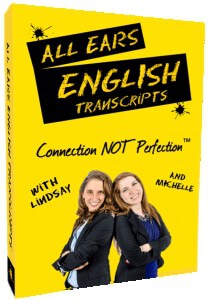Have you heard people say the same word different ways in English?
Do you ever wonder if one pronunciation is better than another?
Today we’re talking about words that can be pronounced in a couple of different ways, both of which can be correct.
Though this may seem confusing at first, it can be a great topic of conversation and even make for some laughs moving forward.

Get Your Transcripts Today!
Make sure you understand every word you hear on All Ears English.
Bring your English to the advanced level with new vocabulary and natural expressions.
Subscribe and get the transcripts delivered by email.
Learn to speak naturally with the American accent.
Same Words With Different Pronunciations
There are many words in the English language that people pronounce differently–this may be somewhat confusing to you at first!
It could be for a regional difference or just a personal preference, but the way in which a word is pronounced can be vastly different.
There are words that you may not even know which version you say, because you are so used to a certain pronunciation.
Even natives may have to really think of how they pronounce certain words, or they may even change it based on the day.
There may be no rhyme or reason as to how words are pronounced overall!
This difference of pronunciations can come up in conversation, and it’s actually a fun topic that you can laugh about with friends.
So today’s episode not only touches on pronunciation, but gives you your next topic to discuss with people in your conversations..
We did an episode on this in the past that may be helpful for you to check out for reference.
Are You Pronouncing “Often” Correctly? Find Out Today
Common Words In This Area
You will find that there are many words that can be pronounced differently when you really take a look at this list.
There are sure to be even more out there, but this is a good start based on everyday life and what you can expect to use in conversation.
- Data: dayta or data
- Niche: nitch or neesh
- Roof: roof or ruff
- Quarter: kwarter or courter
- Coupon: kupon or qpon
- Envelope: envelope or onvelope
- Orange: orange or are-ange
- Florida: florida or flar-ida
These are a few very common words that may be pronounced in completely different ways.
Why Is It Important To Know These Differences?
Why is it important that we know these differences?
You may wonder if it’s really that important in your conversations, and you will find that understanding these differences can help in a couple different ways.
- Will help with listening skills because you will hear both: You will be able to pick up on the differences very easily. Though you might not think that, overtime you will come to readily notice the difference in pronunciation.
- Makes for fun conversations: Yes it can make for some fun conversations and even some good laughs. It’s amazing how even natives can pronounce something so differently.
- Can practice both and choose your favorite: This can become a part of your identity! You can figure out which one you like and then make it your given choice.
You may wonder how you talk about this with other people, which is to say how do you bring up different pronunciations?
If you are trying to ask somebody the given pronunciation of something, you could ask a couple of different questions.
- Do you pronounce SPELL WORD _____ or _____? For example do you pronounce D-A-T-A dayta or data?
- How do you usually say _____? How do you usually say niche- neesh or niche? You can easily choose one and then express both ways.
- I’ve heard some people pronounce it __________. What do you think about that? For example you could say I’ve heard some people pronounce it “areange” What do you think about that?
This helps you to understand why different pronunciations are so different, and why that matters in the long run.
Takeaway
There are SO many examples of these, and we touched on just a few today.
Check out our other episode so that you have an even better understanding of this concept.
This is a common part of English conversation, and a different pronunciation can be a bit confusing at times.
Try these out today and listen for them, and you will come to see which pronunciation works better for you in each case.
If you have any questions, please leave them below in the comments section.
We’ll get back to you as soon as we can.








